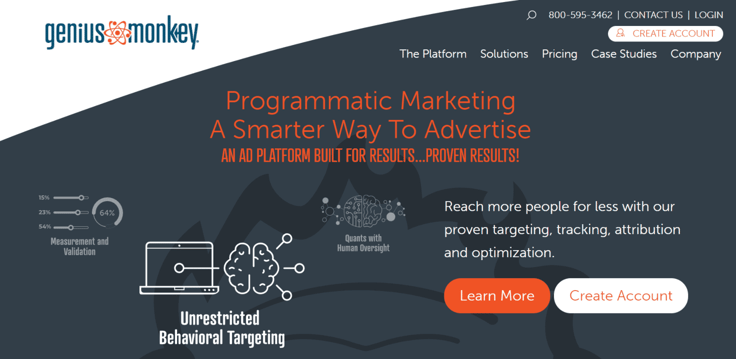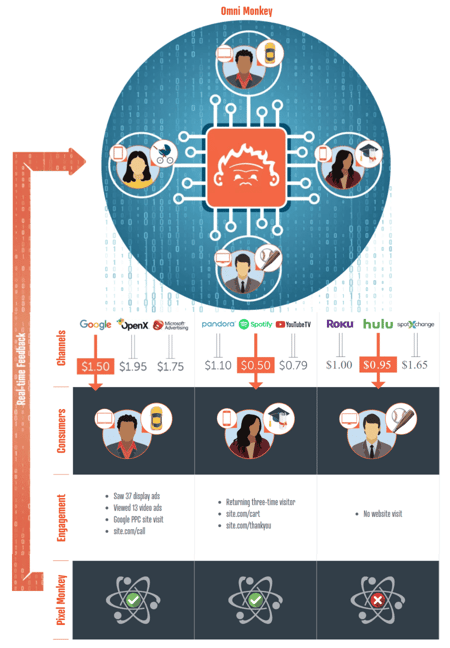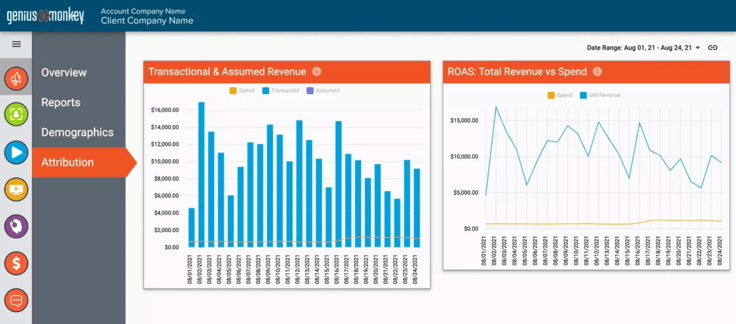
TL; DR: We live in a world where technology rules. As it continues to evolve and seep into all aspects of life — from self-driving cars to personalized medicine — the way we target our audiences also needs to change. The average American sees more than 4,000 advertisements daily, so sticking out in a saturated market — whether you’re Tesla or Hims — requires innovation and adaptability. That’s where Genius Monkey comes in. Its COO, Travis Champ, told us how Genius Monkey stays on top of digital marketing with cutting-edge technologies, including in-house tools and automation software.
Nearly 200 million people tuned in to Super Bowl LVIII. While most people prepped for the year’s greatest sports showdown, others were looking forward to the next best part about the Super Bowl.
Including myself, 43% of surveyed Americans tune in to the Super Bowl each year just for the commercials. Some of 2024’s most famous ads that came out on top include Beyonce’s album announcement via a Verizon commercial, Ben Affleck’s continued obsession with Dunkin’, and Michael Cera with CeraVe — because everybody likes a good pun.
Everybody knows only the biggest brands make it onto the Super Bowl’s roster of commercials, and it’s because the diverse viewership and timing is a perfect storm. For example, would Beyonce’s commercial have gotten as much attention if it aired at 3 AM when everybody was asleep and not during the most-watched singular televised event of the year? (Yes, probably, but I think my point still stands.)

Genius Monkey knows that marketing is an art and a science. The 15-year-old programmatic platform makes advertising more accessible by providing a unified ad platform between multiple demand-side platforms (DSPs) and networks. This way, the reporting is simplified, making the results easy to see.
“All too often in the digital realm, advertisers are going to several different networks or DSPs to try and run their ads and then have to learn the nuances of each, set up individual campaigns in each, go through reporting for each individually, and it just takes way too much time and creates margin for error,” said Travis Champ, COO of Genius Monkey. “Whether the advertiser is a direct brand or agency, managing many different campaigns across many different DSPs gets overwhelming quickly. We saw this problem, so our mission is to simplify and automate the whole process.”
Simplifying Advertising with Genius Monkey
Genius Monkey simplifies business advertising by consolidating many DSPs, SSPs, platforms, and direct deals into one convenient platform. A DSP is like a digital advertising control center: It automates real-time buying and selling of ad space across various digital channels like websites, apps, and videos.
With a DSP, advertisers and agencies can efficiently manage, optimize, and track their ad campaigns, all from a single interface. This means they don’t have to juggle multiple platforms separately — making their advertising efforts more streamlined and effective.
“Advertisers can do a simple buy through us, and it gets into 10, 15, 20+ DSPs without them having to learn anything about any of them or do any heavy lifting,” Travis explained. “We pull in all the reporting into a very accessible and digestible dashboard that has a proprietary path to conversion tracking. This tracking allows billions of data points to rolled up into a robust attribution report, allowing advertisers to see the true effect of their advertising dollars.”
This, Travis said, simplifies the whole process for advertisers so they can have a smaller team and that has significantly less work to try and manage highly effective marketing campaigns.
“We firmly believe everything in marketing should be data-backed. Otherwise, you’re just wasting your ad dollars,” Travis said. “We track conversion for every user and analyze all that data at a very granular level so we can optimize our campaigns toward that.”
For example, Genius Monkey can see whether a single person sees an ad repeatedly but never clicks on it and if they came to the site and converted without ever clicking — or exactly when they finally do click on it. This allows the Genius Monkey algorithm to optimize toward the finest points of data, ultimately leading to increased return on ad spend.
Genius Monkey’s findings may also surprise you. You might assume a landscaping ad would get better conversion rates or traction on ESPN.com than Joe’s Garden Blog, but the data may show you the garden site actually had more valuable impressions.
“Data-backed campaigns just show you so much; without it, you’re missing out on so much opportunity,” Travis said.
In other words, it’s not always about using popular platforms. The real challenge? Finding the right way to reach the people you want to connect with.
In-House Technology Provides Optimal Campaign Performance
The platform automates decision-making processes by using proprietary algorithms and artificial intelligence (AI) technology — such as Genius Monkey’s proprietary software, Omni Monkey and Pixel Monkey, which help optimize campaigns in real-time based on engagement and performance data.
Here’s how it works: Omni Monkey automates the programmatic process based on the performance and engagement of specific channels, devices, and targeted audiences for a better return on ad spend, or ROAS (basically, a return on investment for your marketing campaigns).

Pixel Monkey is an audience engagement tracking system that allows Genius Monkey to track and share the data with Omni Monkey for better optimization.
But the platform doesn’t just talk the talk; it walks the walk.
Case studies show how consistent its’ results are, whether it’s a decreased cost per conversion with better ROAS or targeting the exact audience with surprise sky-high conversion rates.
“At Genius Monkey, we have an agnostic approach, meaning we buy through all different networks and DSPs. So on any given campaign, we might be running 16 different DSPs,” Travis explained.
But he also says none of this is done without the help of automation.
For example, Genius Monkey wants to target people who are interested in gardening. They’ll purposely place ads on Joe’s Garden Blog through different platforms, including Google, Yahoo, Xandr, and many more. The AI then helps them determine which network/DSP gives the best bang for their buck — looking at conversion rates and how much each click will cost.
“It considers these factors for every single targeted user to determine which is worth going after to achieve optimal conversions. This helps us understand the effectiveness of our ad placement and informs our future buying decisions,” Travis said.
Once the AI completes its calculations, it decides where to place the ads. Then, it monitors the campaign in real-time and adjusts the strategy based on what people do on the website.
Genius Monkey and Shaping the Evolving Marketing Landscape
Travis noted many companies are moving away from traditional agencies and instead establishing in-house marketing departments, similar to what was commonplace in the early-mid 2000s.
But factors like wanting lower costs and creative control over strategies mark a shift. Genius Monkey is proof that the marketing industry is shifting.
“I think you’ll see a lot more people move toward fully automated systems that do a lot of the data analysis for them and just let them reap the benefits,” said Travis.
Genius Monkey keeps its finger on the pulse by carefully measuring which networks and mediums work best for each client.
For example, display ads — ads you see on social media, apps, and websites — used to be the norm, but now we’re looking at connected TV ads where advertisers can serve a targeted ad through an Xbox or Samsung TV.
Yes, really: Samsung TVs can gather information on anything you put on that screen, whether it’s a DVD or YouTube video, and platforms like Genius Monkey can target you with that.
“Targeting technology has come a long way over the years and will continue to evolve in the passing of the cookie, ” Travis said.
As for what’s next, Genius Monkey has a few things up its sleeve.
Over the past six months, they’ve integrated new partners to provide an identity graph enabling household mapping, allowing for a better understanding of the household’s technology usage and habits.
“This partnership helps us map every device that a household has correlated with it so that we know every phone, TV, iPad, smartwatch, etc., that may connect to their home IP address, and can then tie those individual device IDs to those individuals even when they leave their home IP. This means if we serve a cellphone at a work office with 10 impressions, but they convert on a laptop on their home IP address, we can map those cellphone impressions to that laptop conversion,” Travis explained. “We have gained a complete understanding of how these devices interact.”

Genius Monkey also enhanced its dashboard to provide more comprehensive attribution beyond its services. This includes tracking conversion and click data from various other sources an advertiser may be running on their own, such as Facebook, Google, TikTok ads, and etcetera. This way, clients can attribute a monetary value to conversions influenced by multiple mediums, which Travis says was a common challenge in understanding the contribution of each advertising channel.
“The biggest gripe we hear is that people may get some of the same conversions from us as they do from Facebook, and even if we influence them, they’re not able to see the full picture,” Travis said, adding, “But the new technology we’re putting out simplifies that process for them.”
If you want to get your brand in front of your exact target audience, then don’t miss out on Genius Monkey and its clever AI. Get a fast and free quote today.



